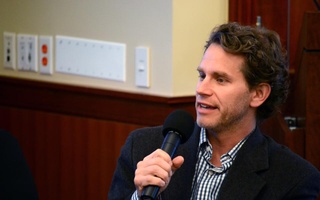A trip to Barrow, Prudhoe Bay, Kaktovik, and the Arctic Village in Alaska involved reporting on possible drilling in the Arctic National Wildlife Refuge.
The Inuit on the edge of the Wildlife Refuge were, much to Lister’s surprise, in favor of drilling that might disrupt caribou migration patterns because of potential job opportunities. But south of the mountain range, where families relied on caribou for survival, opinions were very different.
“So many big environmental stories are not black and white,” Lister says. “And these issues are multidisciplinary in their impact. ... Really no area of the planet is not affected in some way by environmental change, access to water, access to power, and so on.”
‘OFF THE TREADMILL’
As a Nieman affiliate, Lister has explored everything from climate change in Medieval European history to modes of energy production, in addition to auditing a seminar called “This Land is Your Land: North American Environmental History,” taught by History of Science Lecturer Conevery B. Valencius.
Topics in this class include the role of waterways in the creation of federal power, the Native American dispossession of the Great Plains, and the portrayal of industrial intrusions into the environment in literature, poetry, and music.
“I think if we look out the windows of where many of us live and work, it’s hard to see a deeper history because so much of our present is asphalt and pressure-treated glass,” Valencius says. “Tracing the root of how we got to various situations, whether it’s our dependency on fossil fuels or the concentration of humanity into cities, gives us a sense of what kinds of changes or alterations we could possibly make.”
The Nieman Fellowship—which includes 24 fellows and their families each year—encourages fellows and affiliates to attend creative and nonfiction writing seminars, journalism discussions, and community events.
Lister has greatly enjoyed getting “off the treadmill” of 24-hour reporting, which has allowed him to read for pleasure, dabble in fiction writing, and meet other fellows who he says are awe-inspiring and “humbling.”
“Lots of these journalists are based in dangerous places,” he said. “It’s one thing to report on popular events in Zimbabwe and then get on a plane and leave—but that just pales in comparison to some of the things these journalists have to do every day.”
Robert H. Giles, curator of the Nieman Foundation—who was himself a Nieman fellow studying urban affairs and urban renewal in 1966—said the program sees an explicit connection between education and journalism.
“The press is covering a very complex world and they draw great value from the learning that goes on in Harvard classrooms to help them become more knowledgeable and authoritative in the subjects they’re covering,” he says.
Auditing classes is not a one-way street for the Nieman fellows and affiliates, Giles said.
“The fellows bring into each class their experience, their knowledge, their cultural values,” he said. “We get notes from professors every semester saying how much the contributions of the Niemans are appreciated.”
Lister, in fact, is going to be answering questions about environmental journalism in an upcoming session with interested students in Valencius’s seminar class.
Read more in News
Lab Rat Of The Week: Sydney “Alison” KraemerRecommended Articles
-
Nieman Fellow Wins International AwardHollman Morris Rincon, a Colombian journalist and Nieman Fellow who was initially denied a visa this summer to study in the United States, was recently awarded the 2011 Nuremberg International Human Rights Award for his coverage of human rights violations in Colombia.
-
Somali Journalist Recognized for Brave CoverageMohamed Olad Hassan, a Somali journalist who has covered the people of his nation amid dangerous insurgency over the last ...
-
(Not) Eating at HarvardWhile Harvard offers a number of resources for students with eating disorders, eating disorders are often stigmatized and can slip under the radar.
-
Twenty Four Nieman Fellows AnnouncedTwenty-four journalists who work in media ranging from newspapers and magazines to radio and television have been chosen for the 2011-2012 class of Nieman Fellows, the Nieman Foundation for Journalism at Harvard announced on Tuesday.
-
 An Interview with Nieman Fellow Jen B. McDonald
An Interview with Nieman Fellow Jen B. McDonald -
 Journalists Discuss Impact of Social Media on Recent Coverage
Journalists Discuss Impact of Social Media on Recent Coverage













